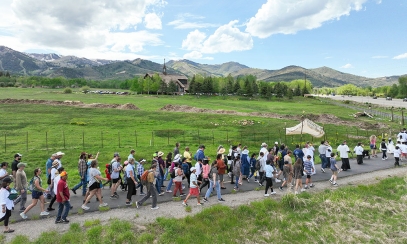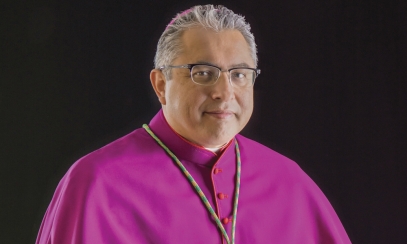
Laudate Deum revisits climate crisis
Pope Francis urges worldwide action, cooperation
Pope Francis urges worldwide action, cooperation
On Oct. 4 – the feast of St. Francis of Assisi – Pope Francis released the apostolic exhortation Laudate Deum (Praise God: To all People of Good Will on the Climate Crisis). The exhortation is a follow-up to his groundbreaking encyclical on the environment, Laudato Si. In it, he says the worldwide climate crisis has become a matter of grave concern that needs immediate attention and requires global cooperation.
On Oct. 4 – the feast of St. Francis of Assisi – Pope Francis released the apostolic exhortation Laudate Deum (Praise God: To all People of Good Will on the Climate Crisis). The exhortation is a follow-up to his groundbreaking encyclical on the environment, Laudato Si. In it, he says the worldwide climate crisis has become a matter of grave concern that needs immediate attention and requires global cooperation.
In the eight years since the release of Laudato Si, his encyclical on caring for our common home, the pope calls the reactions and steps taken to address the worldwide climate crisis increasingly insufficient.
Laudato Si invited us to listen to "both the cry of the earth and the cry of the poor,” he says, while Laudate Deum focuses on the climate crisis. Bishops worldwide were asked to share the document with the clergy and faithful.
Pope Francis says that personal experiences and scientific evidence show us that the climate crisis is overwhelming and has caused great suffering, adding that global governance has been disappointing in its ability to adequately address the issue. The solution requires a multi-pronged approach, the pope says, including personal and cultural changes, alliances, global agreements and multilateralism with real authority, as well as walking together in the same direction.
He emphasizes that climate change is undeniable and its effects are becoming more evident, despite attempts to minimize or ridicule them. The reality is pressing, and human activity is the main cause. Also, the speed with which catastrophes or natural phenomena deepen often makes them irreversible. And although it might not be possible to correct all the damage, the Holy Father is convinced some action still could be taken to avoid more serious problems.
Look for long-term solutions
Pope Francis continues: “What is being asked of us is nothing other than a certain responsibility for the legacy we will leave behind, once we pass from this world.” He adds: “Everything is connected” and “no one is saved alone,” using the COVID-19 pandemic as an example.
We may think that technology and economic power can solve all the problems, as if human ”abilities and possibilities can be infinitely expanded thanks to technology,” he says. He goes on to say that it is “extremely risky” for so much power over our resources to reside in such a small number of people. The pope notes that we are so immersed in what he calls a “technocratic paradigm” that we believe nature is a resource to be exploited and we forget that we are an intrinsic part of it.
He also warns that we must rethink the question of human power and recognize that excessive ambition is not ethically sustainable. If we allow ourselves to be carried away by “the mentality of maximum gain at minimal cost,” it “makes impossible any sincere concern for our common home.”
Pope Francis says that global cooperation is essential to address the climate crisis. The upcoming COP28 in Dubai, sponsored by the United Nations, could be an important turning point if it demonstrates that the efforts since 1992 have been ”serious and worth the effort.”
Toward the end of the document, Pope Francis stresses that we need to overcome the tendency to look for isolated technical solutions. He says it’s important that those who need to intervene think about the common good and the future of their children “more than the short-term interests of certain countries or businesses” because, “What would induce anyone, at this stage, to hold on to power, only to be remembered for their inability to take action when it was urgent and necessary to do so?”
In the last section, titled “Spiritual Motivations,” he reminds the Catholic faithful “of the motivations born of their faith” and their responsibility to care for God’s creation. Implicit in this responsibility is respecting the laws of nature and recognizing the beauty and richness of divine creation. The pope invites us to walk in communion together, and to work for reconciliation with the world that shelters us.
Prayer inspired by Pope Francis’ Laudate Deum (Praise God)
We praise you, O God, Creator of all things, whose mystery unfolds in “a leaf, in a mountain trail, in a dewdrop, in a poor person’s face.”1
Jesus, your Son, taught us to wonder as he made his way throughout the land, contemplating the beauty of creation.2
We pray, O God, that you may stir in us a reverent awareness of our invisible link with the entire created world.
We pray for humility— to remember that we, too, are created and are not creation’s masters.
We pray for compassion— for open eyes and hearts to welcome those forced to flee from their homes due to rising sea levels and drought.
We pray for repentance— so that our thirst for power and domination may be transformed into service.
We pray for simplicity— and the will to turn from our greed which impacts vulnerable people everywhere.
We pray for cultural conversion— that we may simplify our lifestyles, reduce pollution and waste, and exercise prudence in our decision making.
We pray for policy changes— that as a nation and world we may work together to reverse the course of climate change.
Our hearts ache as we ponder: “The world sings of an infinite Love: how can we fail to care for it?”3
We praise you, O God, confident that you work in our hearts and through our actions, so that we may better care for our common home.
Amen.
1 Laudate Deum, Quoting Laudato Si’, no. 233.
2 Laudate Deum, no. 64, quoting Laudato Si’, no. 97.
3 Laudate Deum, no. 65.



